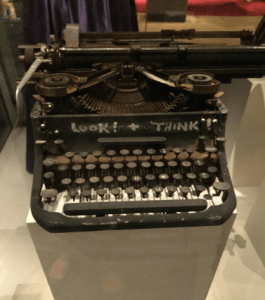In a column by David Brooks in the New York Times, he observed a trend in higher education that is heartening to a professor like me who has publicly advocated in Huffington Post and elsewhere for applying the humanities in professional education. Hoping to encourage a trend that resists a narrowed down focus on producing professionals rather than people, Brooks argues in “The Big University,” that a college education should “leave a mark on the full human being” by promoting conversations that educate the soul.
Yet academics trained in the humanities are often tentative about bringing their ideas to programs that train professionals; likewise, professional degree programs, like the MBA and MPA programs I teach in, can be equally reluctant to expand their offerings to include knowledge and skills acquired by a study in the humanities. My role as a professor trained in religious and literary studies, occupying a position in a school of management, was not a curricular choice but an administrative maneuver. Taking advantage of the circumstances, however, has become my chance to demonstrate what Brooks and others across the educational, policy, and professional spectrum are recognizing more and more: that turning to the fundamentals of education in the humanities is not merely an anachronistic act of desperation but a means of squarely addressing modern anxieties in a rapidly changing material and professional landscape.
While opinion writers across the media have begun supporting and expanding humanities offerings as preparation for work and life, most have neglected to consider those who seldom get past the academic threshold in the first place but whose journeys have taken them to the workplace. Books@Work (booksattwork.org) corrects that oversight. They recognize that only 60% of workers in the U.S. have access to higher education. Many front lines, blue-collar, and even middle management workers lack structured opportunities to engage in intellectual adventures by way of formal education and to benefit from the kinds of skill, knowledge, confidence, and empathy-building experiences that can be elicited from reading and discussing literature.

After talking to the founder and executive director, Ann Smith, about the goals and methods of Books@Work, I was reminded of the work of the Free Southern Theatre, established in 1963 to support the Civil Rights Movement. Although the Free Southern Theatre no longer exists, it established a model for how an organization can recognize the transformative potential of the arts and use literature to stimulate creative and reflective thought around community-based involvement. The program helped create more informed and engaged citizens and broke down social divisions just as Books@Work disrupts the hierarchical structure at many workplaces and promotes the development of skills that directly benefit both the employee and the employer.
While Books@Work may not be attached to a particular social movement, its modest goals to encourage employees to reflect on how they do their jobs and live daily has the potential for a wide-reaching effect. In addition to breaking down workplace divisions, the program also creates town-gown connections as faculty, especially adjuncts struggling to stay employed in their fields, find new inspiration to make connections between their scholarship and their communities. Teaching outside of a university setting challenges academics to demonstrate the relevance of their fields and to amplify the connections between literature and life. Rather than suggesting a displacement of higher education, programs like Books@Work creates not just better employees but prospective students.
Begun in 2010 by Smith, an art historian lawyer with a doctorate in organizational management, Books@Workis now active in 10 states and hopes to go national. Participating companies and community groups reflect a broad spectrum of society. Companies pay the modest costs of the program, including materials and a stipend for the educator who leads three months of seminars. Employees read a book a month and participate with the instructor in selecting the texts to read and discuss in settings deliberately designed for the convenience of the employee. Selections include a wide variety of readings, from classics by Hemingway to short fiction by Dave Eggers, from non-fiction studies like Wilkerson’s The Warmth of Other Suns to YA novels.
Whatever the text, the outcomes are remarkably consistent across all settings where Books@Work has operated. Employees who participate, register greater interest in continuing education with corresponding confidence that they can be successful as students. Soft skills like collaboration, communication, decision-making, and critical thinking all improve and improve employee performance, no matter their task. The workplace becomes more trusting as hierarchies relax and more ethical as literature discussions help people to identify and respond thoughtfully to moral challenges both in and outside of the workplace. As Ann observed, they recognize in literary characters “that could be me” and are open to a reality that they “never knew,” encouraging them to extend their empathetic range and sensitivity to diversity and difference. These outcomes are supported by evidence gathered from three extensive surveys conducted at the beginning, middle, and end of the program.
Books@Work can be read two ways: as a description of what the program carries to the workplace—books—and as an articulation of what happens wherever one reads: books work!